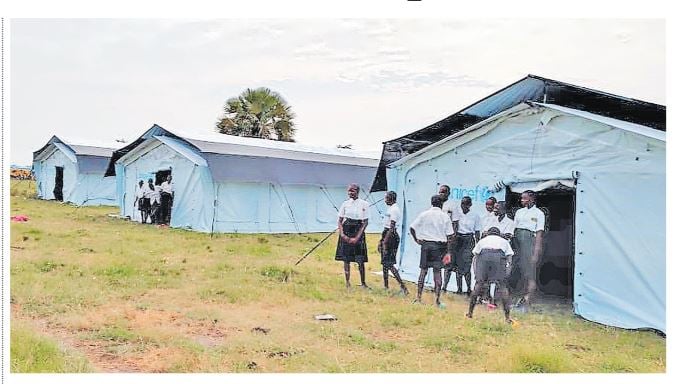Tents come to the rescue of learners battered by floods

Pupils at the makeshift Masaka Primary School on Monday. As schools opened for the third term on Monday, flood-affected schools in Ntoroko District faced significant disruptions, with some relocating and conducting classes in tents. Photo by ALEX ASHABA
What you need to know:
- Masaka Primary School was flooded after River Semuliki burst its banks the end of the second term in August, forcing the school to close. Despite the closure, the Primary Seven pupils sat for their mock exams in flooded classrooms.
- The Ntoroko District chairman, Mr William Kasoro, said last week, the Office of the Prime Minister convened a high-level meeting where several development partners pledged support for the displaced people.
As schools opened for the third term on Monday, flood-affected schools in Ntoroko District faced significant disruptions, with some relocating and conducting classes in tents, leading to low student turnout and teacher absences.
Ntoroko District has been grappling with floods for more than a month after River Semuliki burst its banks. The floods have submerged six sub-counties and affected 24,300 people.
At Masaka Primary School in Butungama Sub- County, the flooding has forced pupils to study in tents a kilometre from the school premises.
The school’s head teacher, Mr Vincent Asiimwe, said the land on which the three tents donated by the United Nations International Children's Emergency Fund (Unicef) were set up, was provided by a parent.
Mr Asiimwe said only 18 out of the 597 pupils enrolled at the school and two teachers reported on Monday, and no classes were held due to a lack of resources, as the desks and blackboards were destroyed by the floods.
“We cannot conduct lessons today (Monday) because there is nowhere for the pupils to sit, no blackboard, and not even a single toilet for them to use. Teachers are also hesitant to report due to these conditions,” he said in an interview with Daily Monitor on Monday.
He said each tent will accommodate two classes, while one class will hold lessons under a tree.
D“I am struggling to keep the school operational, but I have no resources. We haven't received the UPE (Universal Primary Education) funds, and we are still waiting for the promised supplies from Unicef, including blackboards. Save the Children also promised scholastic materials, but we haven’t received them yet,” he added.
Mr Asiimwe said even if more teachers report to the school, they will have nowhere to stay. The two teachers who reported are currently staying in a room provided by a parent in a nearby village.
“To reach the old school, one has to use a canoe from the main road. The entire compound is still flooded, and although the water has receded from some classrooms, we cannot use them as they may collapse on the pupils. We appeal to the government to secure land in a raised area so we can construct permanent structures,” Mr Asiimwe said.
Masaka Primary School was flooded after River Semuliki burst its banks the end of the second term in August, forcing the school to close. Despite the closure, the Primary Seven pupils sat for their mock exams in flooded classrooms.
Rwangara Primary School in Kanara Sub- County is another school affected by the floods. By the end of the second term, the school was still operating on its premises, although buildings had been inundated by floodwaters from Lake Albert. However, at the beginning of September, rising floodwaters led to the relocation of the school to Rwenyana camp for the third term.
The head teacher, Mr Paul Asiimwe, said the school received two tents from Unicef. He, however, said the tents can only accommodate four of the seven classes.
Mr Asiimwe said on Monday, only 10 out of the more than 400 expected pupils reported to school, as learning conditions remain poor.
"Water levels increased. To access it [school] now, one needs a boat. We are currently trying to move some desks to the new location, but the tents are set up in a bush. We only have one mobile toilet, and we have not received the capitation grant needed to run the school," said Mr Asiimwe.
He added that one of the tents will also serve as both the office and staff quarters for the teachers as they await more tents from government and other well-wishers.
Meanwhile, pupils at Umoja Primary School in Kanara Sub- County, have been studying in tents since 2019.
The school was the first in the district to be flooded in 2019, and part of its structures remain underwater to this day. The school was eventually relocated to Rwenyana Internally Displaced People’s Camp.
The Ntoroko District chairman, Mr William Kasoro, said last week, the Office of the Prime Minister convened a high-level meeting where several development partners pledged support for the displaced people.
He said among those partners, Unicef has delivered 12 tents to the affected schools, with an additional 12 tents expected soon.
Mr Kasoro said of the 46 mobile toilets Unicef promised, 26 have been delivered and plans are underway to distribute them to affected schools.
"Unicef also committed to providing scholastic materials, including desks, to help 6,100 pupils in affected communities, schools like Buidiba and Masojo have already received tents because they were also affected by floods," he said.




